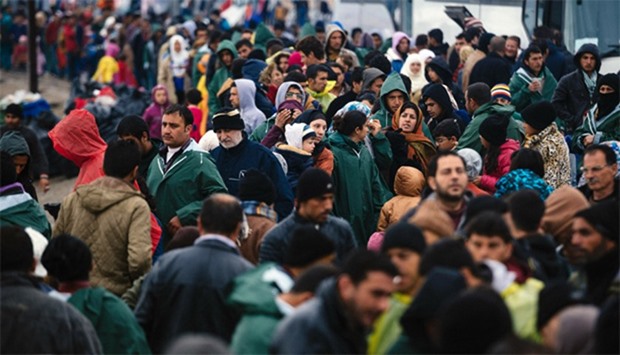But with other countries on the winding refugee trail to northern Europe announcing a near-complete border shutdown, that chance now seems remote.
‘We are hoping a miracle will happen,’ says the Syrian youngster from Aleppo, who has lived in a tent at Idomeni with her mother and two younger brothers for two weeks.
‘We thought Germany wanted us. That's why we took the boat and came here.’
Macedonia on Wednesday confirmed it had not allowed any refugees through, but insisted the border was not closed.
‘The authorities have decided to allow in an equivalent number of migrants who can leave (Macedonian) territory,’ police spokeswoman Natalija Spirova told AFP.
Slovenia and Croatia, two of the countries along the route used by hundreds of thousands of people in recent months, barred entry to transiting migrants from midnight. Serbia indicated it would follow suit.
EU member Slovenia said that the only exceptions were for people wishing to claim asylum in the country or for migrants ‘on humanitarian grounds and in accordance with the rules of the Schengen zone,’ Europe's 26-country passport-free zone.
The measures follow Austria's decision in February to cap the number of migrants passing through its territory, which has led to a gradual tightening of borders through the western Balkans.
Coupled with a steady flow of new arrivals from Turkey, the border restrictions have blocked more than 14,000 mainly Syrian and Iraqi refugees in an unhygienic camp operated by beleaguered aid groups.
Recurring rainfall has turned the area into a bog.
Yuso, a 20-year-old Syrian travelling with his brother, says he is aware of the new restrictions but will soldier on nonetheless.
- 'Nothing else to do' -
‘We know about Slovenia but we'll try to cross the border, we have nothing else to do,’ he says.
With people routinely falsifying their queue number to skip the line for border passage, women have to intervene to stop the simmering tension from breaking into open violence.
Hundreds are waiting to see a doctor or to get a sandwich. In contrast, there are only 100 people queueing in front a UN refugee agency stand to request relocation to another EU state.
This process can take months, and refugees have no say in which country they will eventually end up.
The European Union has in place a scheme to relocate some 160,000 asylum seekers from Greece and Italy, but so far, fewer than a thousand have left.
So it's no surprise that given the option -- and the money -- most here would pay a smuggler to get them through the fence.
‘Some people crossed yesterday through the forest. But we can't go with the children,’ says Mirvat, a 30-year-old teacher from Aleppo travelling with her three children. Her husband is missing in Syria.
‘In Syria there is a war. We can't stay there or in Turkey where there is no money to live. We want to go to Germany and have a decent life,’ says Mirvat.
Ola says she has seen traffickers demanding 2,500 euros ($2,700) per person to provide EU documents and passports to European countries.
The Greek government says there are nearly 36,000 migrants and refugees stranded in the country, but police in the north said there were another 4,000 people unaccounted for.

